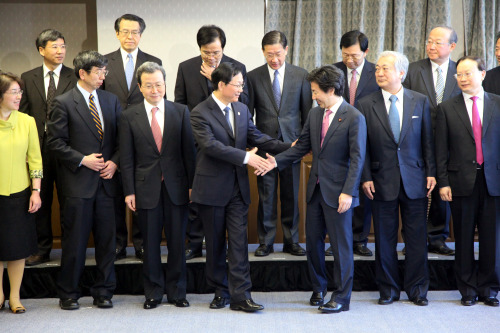Japan and China will seek to coordinate on supporting the International Monetary Fund’s effort to contain Europe’s debt crisis, Japanese Finance Minister Jun Azumi said.
“Rather than make decisions independently, we’ve agreed to consult each other very closely” on financial contributions to the IMF, Azumi told reporters Saturday after meeting with Chinese Finance Minister Xie Xuren in Tokyo.
The finance ministers of Asia’s two largest economies met before the Group of 20 countries gathering later this month in Washington. One topic at the G20 meeting will be increasing cooperation with the IMF. The Fund needs more resources to shield the global economy from threats of strains on Europe’s financial system, rising oil prices and high unemployment, Managing Director Christine Lagarde said this week.
“It won’t probably be smooth for G20 nations to hammer out details for their contributions to the IMF,” Tomoko Fujii, a senior foreign-exchange strategist at Bank of America Merrill Lynch in Tokyo, said before Azumi and Xie met. “It’s important for Japan to check China’s intention on this, while China probably wants to increase its political influence if it puts up money.”
 |
Chinese Finance Minister Xie Xuren (fourth from left) shakes hands with his Japanese counterpart Jun Azumi (third from right) during the 4th dialog between the finance ministers of the two countries in Tokyo on Saturday. (Xinhua-Yonhap News) |
The IMF asked in January for as much as $500 billion in additional lending resources. Member countries have been reluctant to pitch until European nations did more to help themselves. The U.S. has refused to increase its contribution to the fund.
European finance ministers decided March 30 that 500 billion euros ($667 billion) in fresh money would be added to the 300 billion euros already committed to create an 800 billion-euro defense against the two-year-old turmoil. Euro-area finance chiefs insisted that they’ve fulfilled their side of the bargain.
“The firewall European nations presented in March isn’t convincing enough to give momentum to discussions for other countries’ financial contributions to the IMF,” Fujii said.
Concerns about Europe’s debt crisis were rekindled this week as Spain’s borrowing costs surged on concern that the country’s public debt will expand and the region’s fourth- largest economy may ask for a bailout. Yields on Spain’s 10-year bonds rose to a four-month high.
“Europe’s crisis hasn’t ended” even as the situation improves from last year, Azumi said today. “This still needs careful monitoring and we can’t yet become optimistic.”
Japan and China have yet to decide on cooperation with the IMF, and will continue their discussions on this until the G20 meeting, Azumi said Saturday. The nations agreed to strengthen and expand Asia’s regional currency swap agreement, sharing a view that “there is a need for Japan and China to cooperate to prevent crisis in Asia,” he said.
Possible G20 support for the global economy could be similar to a G20 decision in April 2009 to triple the fund’s resources as part of plan to avoid the global economy from slipping into a recession. At the time, the U.S. and Japan each contributed $100 billion, the EU $178 billion and China $50 billion.
Azumi and Xie today agreed the world economy continues to grow at a moderate pace even as many uncertainties still remain, according to a statement released by the Japanese finance ministry.
Today’s meeting is the second this year between the two finance ministers. Azumi visited Beijing in February and met Xie and Vice Premier Wang Qishan.
China last month pared this year’s economic growth target to 7.5 percent from the 8 percent goal in place since 2005, part of government plans to tilt growth toward consumption and away from exports. In the fourth quarter of last year, the world’s second-largest economy grew 8.9 percent.
Azumi said he was told today that China’s domestic demand has been firm and consumption stronger than expected. He said he considers it possible that China can achieve this year’s targeted 7.5 percent growth or ever a greater expansion.
Azumi also said it’s fully possible Japan can achieve its growth goal of 2% for the fiscal year started April 1, as demand from reconstruction is emerging even as the economy struggles with the yen’s appreciation.
(Bloomberg)








